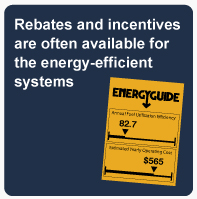
Ductless heat pumps are a triple threat in their ability to heat your Portland home, cool the air and control humidity. Thanks to the relatively mild temperatures that the Portland area receives, energy efficient heat pumps are a great option for those who want to add an HVAC system to their home or wish to upgrade their current equipment. As you shop for a new comfort system, you may find that a mini-split system, or ductless heat pump, offers a keen alternative to forced air technologies while keeping energy costs low.
How Ductless HVAC Systems Work
Ductless heat pumps have an outdoor compressor and indoor air handling units connected by a conduit that contains a refrigerant line, electric cable and condensate drain. Rather than use ductwork, the system circulates refrigerant to heat or cool the air. You may install as many air handlers as you wish—such as one in each room—to meet your heating and cooling needs.
During the winter, a mini-split system absorbs heat from the outside air and moves it into your home. In the summer, it absorbs the warm air in your home and transfers it outside. Rather than generate heat, ductless HVAC systems move it, making them more energy efficient than other systems available.
Benefits of Mini-Split Systems
- Save on installation costs: When a licensed HVAC specialist installs a ductless mini-split in your home, they will drill a hole in the wall or ceiling for the conduit. Unlike ducts, conduits are thin and fit nicely between walls. As a result, you do not have to tear down the walls or ceiling in your home to make room for a ductwork system.A mini-split’s flexibility makes it a great option for those with older homes that can’t accommodate a forced-air system’s ductwork without major remodeling. Homeowners with a central HVAC system also choose ductless systems when they want to condition the air in a new addition to their home.
- No start-stop cycles: Forced-air systems, like central air conditioners, are designed to cycle on and off throughout the day, which can consume a lot of energy. Energy-saving heat pumps run continuously. As a result, the compressor modulates itself to meet your heating and cooling needs rather than run at full capacity. Some models with variable compressors are so efficient that your home may qualify for energy-related certifications, such as Net Zero Energy or LEED.
- Fewer thermal energy losses: Because mini-splits are duct-free, there are no ducts from which conditioned air can escape. Homeowners who make the switch from a forced-air system to a ductless mini-split experience energy costs reductions of up to 25 percent or more.Because a ductless heat pump uses air handlers instead of ducts and registers, you don’t have to heat or cool every room in the home. Setting the temperature for the room you occupy can translate into big savings when the power bill arrives. A multi-zone system allows you to connect up to four air handlers to an outdoor compressor. Whole-house system accommodates up to eight air handlers.
- Aesthetics and home value: Older mini-split systems weren’t known for their attractiveness. Today’s units are more discreet, giving a home a streamlined look that doesn’t detract from its value. A popular style sets into the ceiling, so the only exposed components are the air distribution vents. Some models can also be installed into the floor or a soffit if a home has enough clearance for the unit.
- Lower lifetime costs: As you shop for a new comfort system, you may find that mini-splits are more expensive than central air units. When you consider the overall lifetime costs of the two types of systems, ductless heat pumps tend to offer the greatest savings because:
- Rebates and incentives are often available for the energy-efficient systems.

- You don’t have to tear down walls or remodel your home to make room for ductwork.
- Mini-split installations are faster than a forced-air system installations are, so you won’t pay as much for labor.
- Heat pumps use less energy to maintain the comfort levels in your home.
- The need to maintain, inspect, repair and clean ductwork is eliminated.
- You may improve the quality of indoor air. Ductwork can trap dust, pollen, bacteria and other particles that can affect your health, especially if you have an upper respiratory condition triggered by allergens, such as asthma. When the air in your home is cleaner, you might spend less on medical expenses.
- Rebates and incentives are often available for the energy-efficient systems.
Whether you’re looking to install a home comfort system or upgrade a current one, it’s to your advantage to consider the energy-saving and financial benefits that ductless heat pumps award. Learn more about the options available by scheduling a free consultation with a specialist from AAA Heating & Cooling today.
